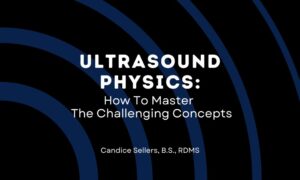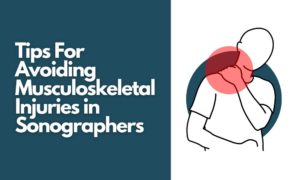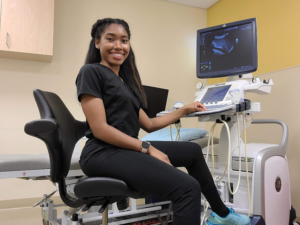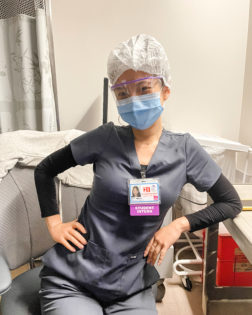Ultrasound Schools Info reached out to several respected sonography professors, program directors, and instructors from across the country. In this article, they share their expert guidance and insight with you.
Advice for Sonography Students
Are you thinking about pursuing a career in medical imaging? If so, you’ve picked a popular career in a growing field.
More and more people from across the country are enrolling in programs to study healthcare, which includes medical imaging. For those who are thinking about becoming a sonographer, you will have the opportunity to work with amazing technology, improve lives, and make a true impact in your community. Not a bad day’s work.
Connect with Educational Programs near You
A particular career path may sound interesting, and you may have the skills required, but is medical imaging the best career for you?
One way to explore career options is to talk to the experts– those who have years of experience and who know the important details about the profession.
University professors and instructors working in healthcare education are great resources. They not only have experience in teaching the subject, but also priceless real-life experience from the field.
Advice for Aspiring Ultrasound Techs
We reached out to faculty members at higher education institutions from across the country, asking them what advice they would give students. Here’s what they had to say.
Jessica L. Murphy, Program Director of Diagnostic Cardiovascular Sonography at Alvin College in Texas, recommends getting your feet a little wet before making any major decisions. “Do your research and professional observations before you get started,” she says. “This is an important decision and healthcare is a great profession, but it’s not for everyone, so do everything in your power to make sure this is the right field for you.”
Murphy, who has over 22 years of experience as a Cardiovascular Sonography educator, also recommends getting to know prospective schools before committing fully to a degree or certificate program. She says you should “…go to the college you are interested in, take a tour and do observations in their labs to make sure you find a school that you fit well with.”
This is wonderful advice! Many have found that seeing the training equipment, classrooms, and meeting the staff in person are great ways to better understand the career, and learn more about a school’s training program.
What Personal Qualities are Important?
Some have said that an ultrasound tech, X-ray tech, or an MRI technologist’s key focus is on the imaging technology and tools. However most have found their communication and people skills are equally, if not more important.
“The advice I would give to aspiring medical imaging students is that you have to have excellent communication skills to work in the health field,” says Lynn Mitts, the Director for both the Radiologic Technology and Diagnostic Medical Sonography programs at Cypress College in California.
Communication is vital between the medical imager and their colleagues, such as communicating test results and findings to physicians. It’s also vital for interactions with patients.
Communicating with patients can range from answering any questions they may have about the procedure, to empathizing with them if they are feeling anxious about the exam.
“Be sure to research the different avenues of ultrasound and have a basic understanding of what this career will require of you. It is imperative to understand the level of responsibility required by a Sonographer.”
Extended interview with Emily Downs, Program Director of the Diagnostic Medical Sonography Program of Denver at CU.
Pamela Brower, the Department Chair of Diagnostic Medical Sonography at Tyler Junior College in Texas says that sonographers need to be committed and to prioritize patient care. “I would encourage all aspiring sonographers to be ‘all-in’. This is about patient care… We are commissioned to be the best each time we pick up the transducer regardless the ethnicity, the time of day or the type of scan. It’s about the patient!”, Brower says.
Continuous Learning is Key
Medical imaging has come a long way in terms of how the modalities are used and how the various technologies have advanced. With that in mind, whether you want to be an ultrasound technician, a cardiovascular technologist or a CAT scan specialist, you need to be willing to continuously learn about new techniques, equipment, pathology and other subjects related to the job.
“I would enforce that the field is dynamic and ever changing,” says Debra Krukowski, Coordinator of the Diagnostic Medical Sonography program at Triton College in Illinois. “This isn’t a field where you can graduate and be done learning. Every patient, every procedure and every new advancement leaves us room to grow. To me it keeps us on our toes and keeps us growing.”
A Summary of Skills
No matter the professional field you are thinking of entering, whether it’s in medical imaging, in healthcare or something completely different, talk to someone who has some direct experience and knowledge with the profession. Find out what it’s like to work a typical day, what the challenges are but also the rewards, what essential skills and qualities are needed.
If you’re thinking of working in ultrasound, check out a list of 10 skills/traits an “invaluable sonographer” should have, according to Lila DeCubellis, a Cardiovascular Technology Professor at Santa Fe College in Florida:
- Provides excellent patient care before, during and after the exam.
- Understands the indications for the exam and how it applies to the patient.
- Gathers and understands the needed pertinent information from the patient’s medical record.
- Is thoroughly knowledgeable about the anatomy and physiology he/she is imaging.
- Applies the principles of ultrasound physics to optimize images and adjusts for artifact.
- Is knowledgeable about the pathophysiology of the disease state being evaluated.
- Provides thorough answers to exam indication for the reading physician.
- Thinks critically: During the exam there is a single opportunity to obtain the images –critical thinking steers the educated sonographer to seek the needed images and information to answer the question at hand.
- Consistently maintains professionalism by setting examples for others.
- Remains current by broadening his/her knowledge base via continuing education.
~ Lila DeCubellis – Cardiovascular Technology Professor at Santa Fe College in Florida
We hope you found this information helpful on your journey in education and career development. Thank you to everyone who was able to share their wisdom with our readers.
If you are an educator in medical imaging and would like to support our mission of providing quality career and education information, please contact us to contribute.












